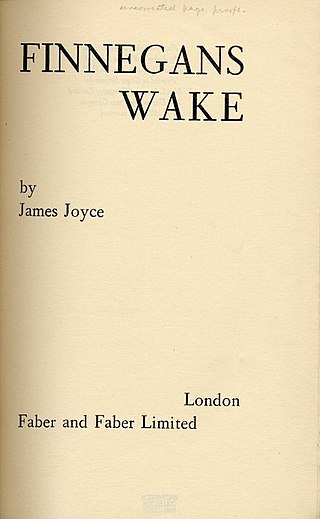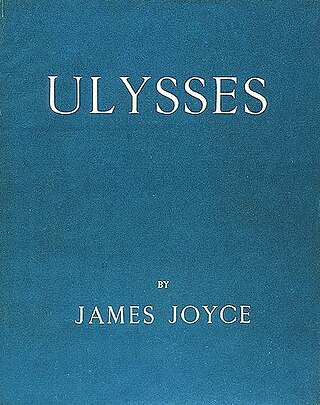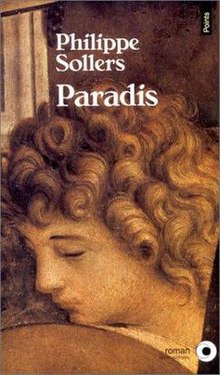In legal discourse, an author is the creator of an original work, whether that work is in written, graphic, or recorded medium. The creation of such a work is an act of authorship. Thus, a sculptor, painter, or composer, is an author of their respective sculptures, paintings, or compositions, even though in common parlance, an author is often thought of as the writer of a book, article, play, or other written work. In the case of a work for hire, the employer or commissioning party is considered the author of the work, even if they did not write or otherwise create the work, but merely instructed another individual to do so.

The Divine Comedy is an Italian narrative poem by Dante Alighieri, begun c. 1308 and completed around 1321, shortly before the author's death. It is widely considered the pre-eminent work in Italian literature and one of the greatest works of Western literature. The poem's imaginative vision of the afterlife is representative of the medieval worldview as it existed in the Western Church by the 14th century. It helped establish the Tuscan language, in which it is written, as the standardized Italian language. It is divided into three parts: Inferno, Purgatorio, and Paradiso.

Finnegans Wake is a novel by Irish writer James Joyce. It is known for its experimental style and its reputation as one of the most difficult works of fiction in the Western canon. Written over a period of seventeen years and published in 1939, the novel was Joyce's final work. It is written in a largely idiosyncratic language that blends standard English with neologisms, portmanteau words, Irish mannerisms, and puns in multiple languages. It has been categorized as "a work of fiction which combines a body of fables [...] with the work of analysis and deconstruction"; many critics believe the technique was Joyce's attempt to recreate the experience of the dreaming and half-wakened state, reproducing the way in which concepts, memories, people, and places become amalgamated in dreaming. It has also been regarded as an attempt by Joyce to combine many of his prior aesthetic ideas, with references to other works and outside ideas woven into the text. Although critics have described it as unintelligible, Joyce asserted that every syllable could be justified. Due to its linguistic experiments, stream of consciousness writing style, literary allusions, free dream associations, and abandonment of narrative conventions, Finnegans Wake remains largely unread by the general public.

Roland Gérard Barthes was a French literary theorist, essayist, philosopher, critic, and semiotician. His work engaged in the analysis of a variety of sign systems, mainly derived from Western popular culture. His ideas explored a diverse range of fields and influenced the development of many schools of theory, including structuralism, anthropology, literary theory, and post-structuralism.

Purgatorio is the second part of Dante's Divine Comedy, following the Inferno and preceding the Paradiso. The poem was written in the early 14th century. It is an allegory telling of the climb of Dante up the Mount of Purgatory, guided by the Roman poet Virgil – except for the last four cantos, at which point Beatrice takes over as Dante's guide. Allegorically, Purgatorio represents the penitent Christian life. In describing the climb Dante discusses the nature of sin, examples of vice and virtue, as well as moral issues in politics and in the Church. The poem posits the theory that all sins arise from love – either perverted love directed towards others' harm, or deficient love, or the disordered or excessive love of good things.

Philippe Sollers was a French writer and critic. In 1960 he founded the avant garde literary journal Tel Quel, which was published by Le Seuil and ran until 1982. Sollers then created the journal L'Infini, published first by Denoel, then by Gallimard with Sollers remaining as sole editor.
Tel Quel was a French avant-garde literary magazine published between 1960 and 1982.

Brunetto Latini was an Italian philosopher, scholar, notary, politician and statesman. He was a teacher and friend of Dante Alighieri.
"The Death of the Author" is a 1967 essay by the French literary critic and theorist Roland Barthes (1915–1980). Barthes' essay argues against traditional literary criticism's practice of relying on the intentions and biography of an author to definitively explain the "ultimate meaning" of a text. Instead, the essay emphasizes the primacy of each individual reader's interpretation of the work over any "definitive" meaning intended by the author, a process in which subtle or unnoticed characteristics may be drawn out for new insight. The essay's first English-language publication was in the American journal Aspen, no. 5–6 in 1967; the French debut was in the magazine Manteia, no. 5 (1968). The essay later appeared in an anthology of Barthes' essays, Image-Music-Text (1977), a book that also included his "From Work to Text".
Haroldo Eurico Browne de Campos was a Brazilian poet, critic, professor and translator. He is widely regarded as one of the most important figures in Brazilian literature since 1950.

Our Exagmination Round His Factification for Incamination of Work in Progress is a 1929 collection of critical essays, and two letters, on the subject of James Joyce's book Finnegans Wake, then being published in discrete sections under the title Work in Progress. All the essays are by writers who knew Joyce personally and who followed the book through its development:

Inferno is the first part of Italian writer Dante Alighieri's 14th-century narrative poem The Divine Comedy. It is followed by Purgatorio and Paradiso. The Inferno describes the journey of a fictionalised version of Dante himself through Hell, guided by the ancient Roman poet Virgil. In the poem, Hell is depicted as nine concentric circles of torment located within the Earth; it is the "realm [...] of those who have rejected spiritual values by yielding to bestial appetites or violence, or by perverting their human intellect to fraud or malice against their fellowmen". As an allegory, the Divine Comedy represents the journey of the soul toward God, with the Inferno describing the recognition and rejection of sin.

Francisco García Tortosa was a Spanish University Professor, literary critic, and translator into Spanish. In Spain García Tortosa is considered one of the chief experts on the figure and work of the Irish writer, James Joyce, whose creations he has translated and about which he has published a wide range of studies. The Irish hispanist, Ian Gibson, has called García Tortosa «Spain's leading expert on Joyce», while considering his translation of Ulysses, in collaboration with María Luisa Venegas, as «prodigious».

The encyclopedic novel is a literary concept popularised by Edward Mendelson in two 1976 essays referring to a work of fiction with an exhaustive, encyclopedia-like scope and writing style. In Mendelson's formulation, encyclopedic novels "attempt to render the full range of knowledge and beliefs of a national culture, while identifying the ideological perspectives from which that culture shapes and interprets its knowledge". In more general terms, the encyclopedic novel is a long, complex work of fiction that incorporates extensive information, often from specialized disciplines of science and the humanities. Mendelson's essays examine the encyclopedic tendency in the history of literature, considering the Divine Comedy, Don Quixote, Faust, Moby-Dick, and War and Peace, with an emphasis on the modern Ulysses and Gravity's Rainbow. Commonly cited examples of encyclopedic novels in the postmodern period include, in addition to Pynchon, Richard Powers' The Gold Bug Variations (1991), David Foster Wallace's Infinite Jest (1996), and Don DeLillo's Underworld (1997). Other literary critics have explored the concept since, attempting to understand the function and effect of "encyclopedic" narratives, and coining the related terms systems novel and maximalist novel.
A–Ronne is a composition by the Italian composer Luciano Berio, composed in June 1974 as a tape composition for 5 actors and arranged in 1975 for unaccompanied vocal ensemble.
Waywords and Meansigns: Recreating Finnegans Wake [in its whole wholume] is an international project setting James Joyce's novel Finnegans Wake to music. Waywords and Meansigns has released two editions of audio, each offering an unabridged musical adaptation of Joyce's book. A third edition, featuring over 100 artists and performing much shorter passages of the book, debuted May 4, 2017.

Women is a 1983 novel by French novelist Philippe Sollers. First published in English translation in 1990, Women marked Sollers's move to a more accessible form of fiction writing after a series of difficult experimental texts. The novel was a best-seller in France and attracted attention as a roman à clef that contained recognizable portraits of significant French intellectual figures, such as Louis Althusser, Roland Barthes, Jacques Lacan, and Sollers himself.

H is a 1973 novel by French novelist Philippe Sollers. The novel was distinguished by its lack of punctuation, similar to Sollers's novels Lois and Paradis. The book was published in English translation in 2015. Critic Roland Champagne describes H as the "culmination" of the "breakdown in traditional writing for Sollers," a period that began with Sollers's novel Lois.

The Divine Comedy Illustrated by Botticelli is a manuscript of the Divine Comedy by Dante, illustrated by 92 full-page pictures by Sandro Botticelli that are considered masterpieces and amongst the best works of the Renaissance painter. The images are mostly not taken beyond silverpoint drawings, many worked over in ink, but four pages are fully coloured. The manuscript eventually disappeared and most of it was rediscovered in the late nineteenth century, having been detected in the collection of the Duke of Hamilton by Gustav Friedrich Waagen, with a few other pages being found in the Vatican Library. Botticelli had earlier produced drawings, now lost, to be turned into engravings for a printed edition, although only the first nineteen of the hundred cantos were illustrated.
Fictional encyclopaedism is a term used in literary studies to refer to a style of fiction writing where an author amasses an exhaustive amount of detail about a fictional world to include in or prepare for writing a work of fiction. It is not to be confused with fictional encyclopedias such as the Encyclopedia Galactica, Tlön, Uqbar, Orbis Tertius, and The Hitchhiker's Guide to the Galaxy.













